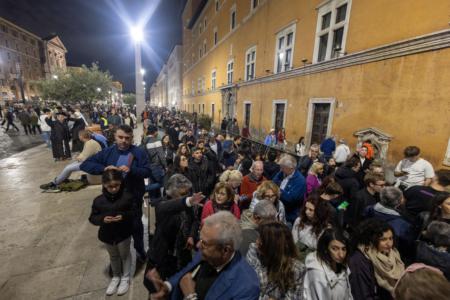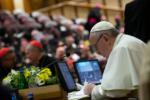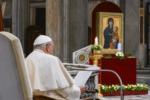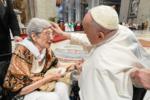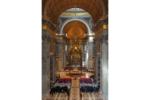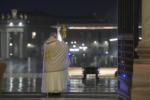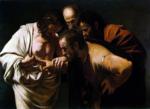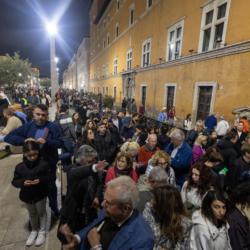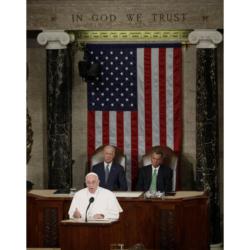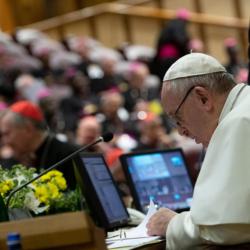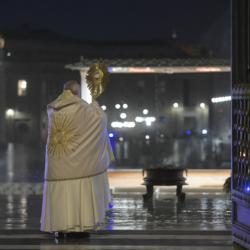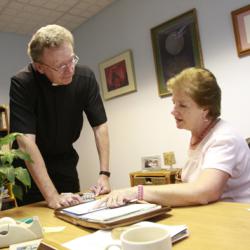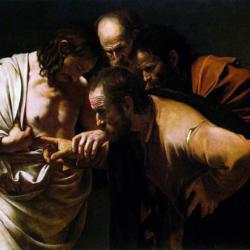Pope Francis' approach to key issues did not fit neatly in US politics, experts say
WASHINGTON (OSV News) -- Pope Francis' approach to key issues including his concern for the environment, immigration and abortion did not fit neatly into American political ideologies, Catholic political and theology experts told OSV News.
Pope Francis, formerly Argentine Cardinal Jorge Mario Bergoglio, died April 21 at age 88, a little more than a month after marking his 12th anniversary as pontiff.
During his pontificate, Pope Francis rejected the notion of the church as a political organization, emphasizing themes such as caring for marginalized people and creation. But these interconnected themes often differed from partisan American political ideologies, Catholics in politics or related fields told OSV News.
Vincent Miller, a professor at the University of Dayton, Ohio, who studies Catholic theology and culture, told OSV News that while Pope Francis was "often described as liberal, I don't think liberal/conservative really helps us understand what he was about," arguing he should be understood as a pastor.
The beginning of Pope Francis's papacy "excited so many people, across large swaths of even our very divided U.S. Catholic Church," Charlie Camosy, professor of medical humanities at the Creighton School of Medicine and moral theology fellow at St. Joseph Seminary in New York, told OSV News. "And I thought about how sad it was that things remain so divided here at the end."
Richard Wood, a sociologist and president of the Institute for Advanced Catholic Studies at the University of Southern California, told OSV News, Pope Francis created "a sense of welcoming in the church.""Of course, in principle the church is always welcoming to all," Wood said, "but it certainly didn't feel welcoming to some folks. But Pope Francis clearly set a tone that helped people feel more welcome."
"I think he showed us what's possible, out of the Catholic tradition, creating dialogue, bringing people together across divides," he said.
But Stephen P. White, executive director of The Catholic Project at The Catholic University of America in Washington, said, "I don't think that he's moved the needle a whole lot politically in the United States for reasons that mostly have to do with our own politics."
The "distinctiveness" of a Catholic in public life that shaped viewpoints around the presidency of John F. Kennedy had faded by the time of Pope Francis pontificate, White said. He pointed to former President Joe Biden, a Democrat, and Vice President JD Vance, a Republican, as two Catholic politicians different in political persuasion and style, who were both vice presidents in relatively short succession.
Pope Francis' tenure overlapped with that of Biden, who as the nation's second Catholic president was sometimes at odds with the U.S. bishops, most notably over his administration's abortion policy, with some bishops suggesting that he should be denied Communion due to his public support for abortion.
Camosy argued that it "is totally appropriate and important that popes criticize the most powerful nation on Earth."
"We in the U.S. are quite obviously not free from error, and it is good when popes correct error -- especially, again, when it comes from the powerful," Camosy said.
"However, it did at least seem like Pope Francis was at times getting bad information on what was actually happening here in the United States," he said. Camosy argued the pope might have otherwise criticized Biden's abortion policy more specifically, although he did often uphold the church's position on the issue in other public statements.
Miller said Pope Francis had both "profound concern about the politicization of the Eucharist," and rejected those calls, but also was "consistently clear" about the Catholic Church's opposition to abortion.
"I think Pope Francis saw the danger of the culture war ... where the church becomes defined by political divides, where the church's moral teaching is yoked to a particular partisan program -- and he saw that as profoundly dangerous," Miller said.
An example of Pope Francis being "unusually specific in terms of criticizing particular policies" came in his final weeks, Miller said. The Holy Father released a letter in February to the U.S. bishops, Catholics and all people of goodwill, responding to "the major crisis that is taking place in the United States" created by President Donald Trump's plans to target the country's immigrants who lack legal authorization to live and work in the U.S. -- among them more than 10 million Christians -- for mass deportation.
"What is built on the basis of force, and not on the truth about the equal dignity of every human being, begins badly and will end badly," he warned.
"It was directly in response to the beginnings of the mass deportations," Miller said. "He's not afraid to speak on the behalf of those whose human dignity is being ignored and dismissed. But also he speaks to the Catholic Church. He speaks to the faithful ... not to give in to narratives that discriminate against and cause unnecessary suffering to our migrant and refugee brothers and sisters. This is political, but it's also pastoral."
One glimpse of how Pope Francis saw political issues as intertwined was in his 2015 encyclical "Laudato Si'" on the call to care for "our common home," outlining how he views "concern for nature" and "justice for the poor" as inherently connected.
In that document, Pope Francis cited St. Francis of Assisi, a 13th-century Italian saint whose name he chose to guide his pontificate, as "the example par excellence of care for the vulnerable and of an integral ecology lived out joyfully and authentically."
That document was praised by lawmakers in the U.S. for whom climate issues are key priorities, including former Democratic presidential candidate Sen. Bernie Sanders, I-Vt. But as a part of his critiques of what he dubbed the "throwaway culture," Pope Francis described abortion as a part of a culture of waste.
"Since everything is interrelated, concern for the protection of nature is also incompatible with the justification of abortion. How can we genuinely teach the importance of concern for other vulnerable beings, however troublesome or inconvenient they may be, if we fail to protect a human embryo, even when its presence is uncomfortable and creates difficulties?" Pope Francis wrote in the encyclical.
"I actually think 'Laudato Si'' has a chance to be sort of the strongest part of his magisterial legacy," White said, rather than a political one.
Miller called the environmental encyclical "a deeply orthodox document."
"But in a country that had grown accustomed to seeing the Catholic Church stand with the right end of the political spectrum, this landed as disruptive," he said.
On Easter, the final full day of his life, Pope Francis met with Vice President JD Vance, who was visiting Rome.
White said there was "something wholesome and fitting about the last meeting between JD Vance and Pope Francis."
"Here were two men, with any number of real differences and disagreements, meeting not to spar over politics, but to share the joy of Easter face to face," he said.
Miller also called the meeting "a quite fitting end to his papacy."
"And I very much pray that that bears fruit for the church and for Vice President Vance and for this country," he said.
- - - Kate Scanlon is a national reporter for OSV News covering Washington. Follow her on X @kgscanlon.
